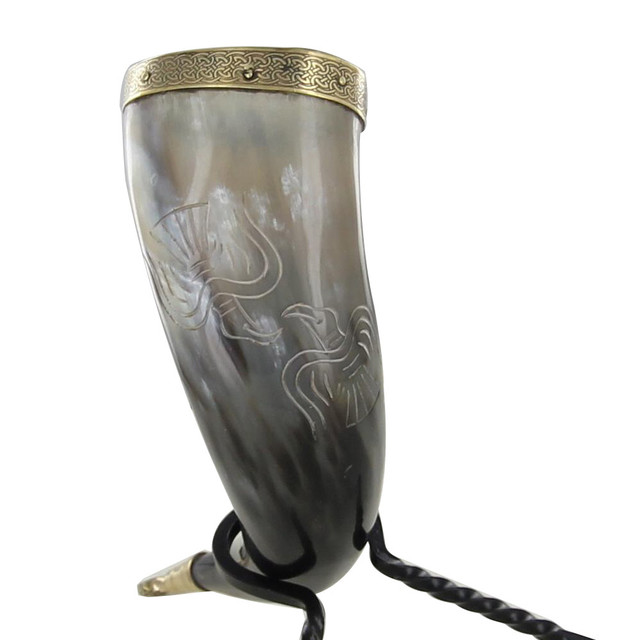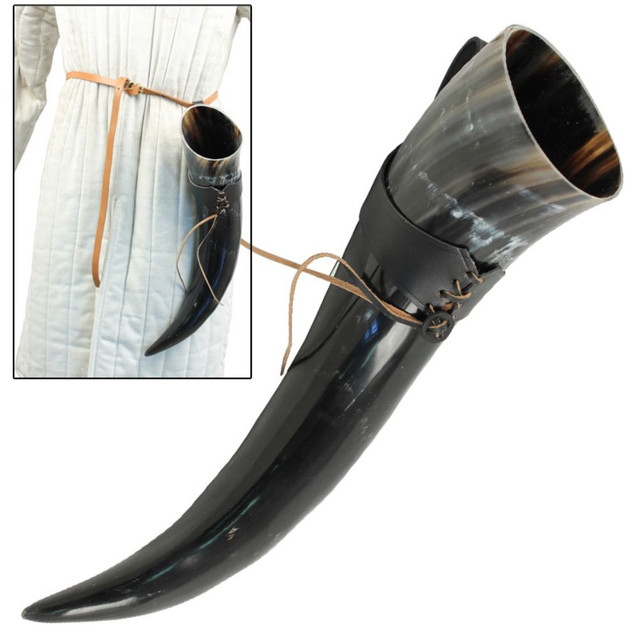The Symbolism of Drinking Horns: Power, Prestige, and Ceremony
Posted by SwordsSwords on Jul 31st 2024
Drinking horns have held a significant place in human culture for centuries, embodying a rich tapestry of symbolism that transcends geographical and historical boundaries. These ancient vessels, often crafted from animal horns, are more than just tools for consuming beverages; they are potent symbols of power, prestige, and ceremonial importance.
Historical Symbolism of Drinking Horns
In many ancient societies, drinking horns were emblematic of status and power. The use of these vessels can be traced back to early cultures in Europe and Asia. The Viking drinking horn, for instance, stands as a vivid representation of Norse culture and mythology. In Viking society, these horns were not merely functional objects but held profound ceremonial significance. They were often used in rituals and feasts, symbolizing the connection between the mortal world and the divine.

The Vikings were known for their elaborate feasts where horns for drinking were used to serve mead—a beverage steeped in ritualistic importance. Mead, often referred to as drinking horn mead, was considered a gift from the gods, and drinking from a horn was thought to bestow divine favor and protection. The horn itself was a symbol of the drinker's strength and valor, reflecting their place in the social hierarchy.
Cultural Variations and Ceremonial Uses
Across different cultures, drinking horns have been utilized in various ceremonial contexts. In Celtic societies, for example, the drinking horn was a symbol of nobility and was often used during significant ceremonies. These horns were sometimes decorated with intricate designs and symbols that denoted the rank and heritage of the owner. Drinking from such a horn was a mark of high status and was reserved for important gatherings and rituals.
Similarly, in ancient Greece, horns were associated with the god Dionysus, the deity of wine and revelry. The Greeks used drinking horns in their Dionysian festivals, where the horns were filled with wine and used in toasts and celebratory rituals. This practice underscored the horn's association with both divine blessing and communal joy.
In contrast, Native American cultures also embraced the use of horns, though in a different context. For many tribes, horns were used in sacred ceremonies and rituals, often in conjunction with traditional songs and dances. The horn's role in these ceremonies was to symbolize the connection between the spiritual and earthly realms, serving as a conduit for prayer and blessing.
Modern Symbolism and Revival
In contemporary times, the drinking horn has experienced a revival as a symbol of historical and cultural appreciation. Enthusiasts and collectors often seek out drinking horns for sale, not only for their aesthetic value but also for their historical and symbolic significance. Modern artisans continue to craft these horns, drawing inspiration from ancient traditions and incorporating them into modern ceremonial practices.
The resurgence of interest in Viking drinking horns reflects a broader fascination with Norse history and mythology. Many people today view these horns as a way to connect with their heritage or to participate in historical reenactments. For some, owning and using a drinking horn is a form of personal empowerment, a way to tap into the power and prestige associated with these ancient vessels.

Drinking Horns in Contemporary Ceremonies
In contemporary ceremonial practices, drinking horns continue to symbolize power and prestige. They are frequently used in themed events, historical reenactments, and personal rituals. The use of horns for drinking in such settings serves as a tangible link to the past, providing participants with a sense of continuity and connection to ancient traditions.
Events such as medieval feasts, Viking reenactments, and fantasy-themed gatherings often feature drinking horns as key elements of the celebration. These modern ceremonies often blend historical accuracy with personal and communal meaning, allowing individuals to experience the symbolism of the drinking horn in a modern context.
Conclusion
The drinking horn, with its rich historical background and symbolic significance, remains a powerful symbol of power, prestige, and ceremony. From the Viking mead halls to contemporary celebrations, these ancient vessels continue to capture the imagination and respect of those who value tradition and cultural heritage.
For those interested in exploring the world of drinking horns, swordsswords.com offers a variety of options. Whether you're looking for a traditional Viking drinking horn, a unique horn for drinking, or fine drinking horn mead, you'll find quality products that honor the rich history and symbolism of these ancient vessels. Embrace the tradition and elevate your ceremonial practices with a piece of history that speaks to power and prestige.
Feel free to browse and find the perfect drinking horn for your needs at swordsswords.com.

